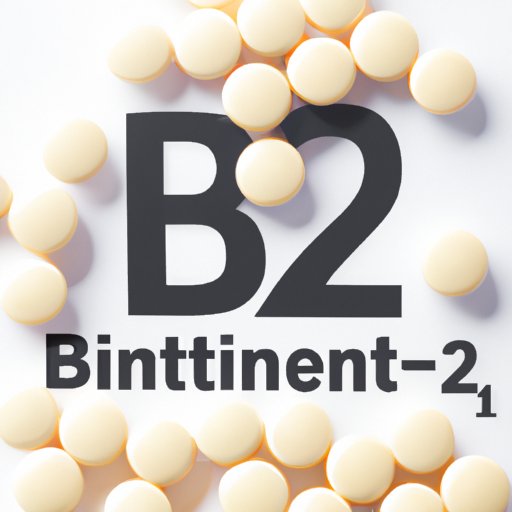
Introduction
B12 Vitamin is an essential nutrient that plays a vital role in maintaining good health. It is necessary for proper brain function, red blood cell formation, nerve signaling, and more. While it is found in many foods, some people may still be deficient in B12 Vitamin due to various reasons. This article aims to provide information about B12 Vitamin, its importance for overall health and wellbeing, and solutions for deficiency.
The Importance of B12 Vitamin for Your Health and Wellbeing
B12 Vitamin is a critical component of human health, impacting many bodily systems and functions. It is essential for maintaining good nerve function, supporting red blood cell production, and promoting healthy brain function. In addition, B12 Vitamin plays a critical role in DNA synthesis, which is necessary for proper cell replication.
Getting enough B12 Vitamin helps to maintain a healthy heart, supports skin health, and enhances overall energy levels. It is also essential for proper metabolism of nutrients, including carbohydrates and fats.
The recommended daily intake of B12 Vitamin is approximately 2.4 micrograms for adults. However, needs may vary depending on age, gender, and lifestyle factors.
How B12 Vitamin Helps in Maintaining a Healthy Nervous System
B12 Vitamin plays a significant role in maintaining a healthy nervous system, as it helps to create a substance called myelin that coats nerve fibers. This coating allows for fast and efficient transmission of nerve signals in the body. A deficiency in B12 Vitamin can lead to nerve damage, impairing proper transmission of signals.
In addition, B12 Vitamin has been linked to improved mood and brain function. It is thought to help with the production of neurotransmitters that regulate mood, such as serotonin and dopamine. Low levels of B12 Vitamin have been associated with depression and cognitive impairment, including memory loss and dementia.
Neurological disorders that may occur due to B12 Vitamin deficiency include peripheral neuropathy, which causes numbness and tingling in the hands and feet, and optic neuropathy, which impairs vision.
The Role of B12 Vitamin in Red Blood Cell Formation and Its Impact on Energy Levels
B12 Vitamin is essential for the production of red blood cells, which carry oxygen throughout the body. Without enough B12 Vitamin, the body cannot produce enough healthy red blood cells, leading to anemia. Anemia can cause fatigue, weakness, and shortness of breath.
Furthermore, B12 Vitamin allows the body to use fatty acids and carbohydrates for energy production. A deficiency in B12 Vitamin can lead to decreased energy levels, making it challenging to carry out daily activities.
Some common symptoms of B12 Vitamin deficiency include fatigue, weakness, dizziness, and difficulty breathing.
B12 Vitamin Deficiency: Symptoms, Causes, Prevention, and Remedies
B12 Vitamin deficiency can occur due to various reasons, including dietary factors and medical conditions. Some individuals are at a higher risk of deficiency due to factors such as age, vegetarian or vegan diets, and gastrointestinal issues that impair nutrient absorption.
Common symptoms of B12 Vitamin deficiency include fatigue, weakness, pale skin, constipation or diarrhea, numbness or tingling in the hands and feet, and difficulty maintaining balance.
Preventing B12 Vitamin deficiency can be achieved through a balanced and varied diet that includes animal products such as meat, fish, poultry, and dairy. For individuals who are unable to get enough B12 Vitamin through diet alone, supplements may be necessary. Supplements can come in the form of pills, sprays, or drops.
For those who have a severe B12 Vitamin deficiency, injections may be necessary to restore proper levels. Injections are administered regularly under the supervision of a healthcare professional.
Why a Balanced Diet is Crucial to Getting Enough B12 Vitamin
Incorporating B12-rich foods into your diet is a crucial part of preventing B12 Vitamin deficiency. Foods such as meat, fish, dairy, and eggs are rich in B12 Vitamin. However, those who follow vegetarian or vegan diets may need to take extra care in ensuring they get enough B12 Vitamin through fortified foods or supplements.
Eating a balanced diet with a variety of foods can also help prevent a deficiency in other essential nutrients that work together with B12 Vitamin to promote good health.
How to Supplement your Diet with B12 Vitamin and When to Consider B12 Injections
Supplementing your diet with B12 Vitamin can help prevent a deficiency. Supplements can come in different forms, including pills, sprays, or drops, and can provide varying amounts of B12 Vitamin.
Individuals who are unable to get enough B12 Vitamin through diet or supplements may need to consider injections. Injections usually are given once a month or as recommended by a healthcare professional and can help restore proper B12 Vitamin levels.
Conclusion
B12 Vitamin is an essential nutrient that plays a critical role in maintaining good health and wellbeing. It is necessary for good nerve function, red blood cell formation, and energy production. A deficiency in B12 Vitamin can lead to various symptoms and affect many bodily functions.
Thankfully, a balanced and varied diet that includes B12-rich foods can typically provide enough B12 Vitamin for most individuals. For those who are at risk of deficiency or those who have a severe deficiency, supplements or injections may be necessary. By taking proactive measures to get enough B12 Vitamin, individuals can ensure that their bodies are functioning at their best.




